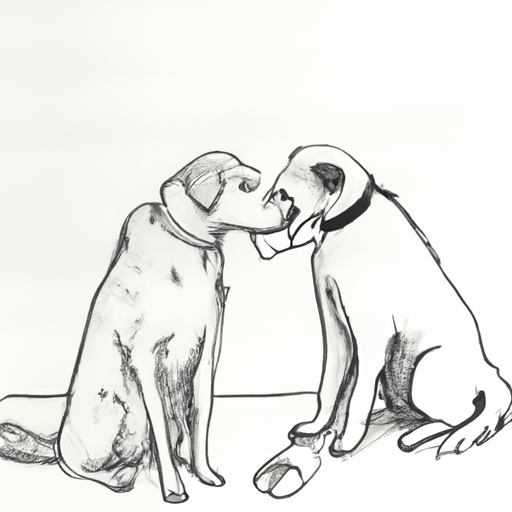Have you ever wondered why dogs lick other dogs’ wounds? It’s not just because they’re being good friends or showing sympathy. It’s a behavior rooted in their instincts and can have both beneficial and harmful effects. This article will explore the reasons behind this intriguing behavior, the benefits, the potential dangers, and how you, as a caregiver, should react to it.
A Natural Instinct
Dogs, like many other animals, have a primal instinct to lick wounds. This behavior is not limited to dogs but is prevalent in many other species as well. This instinct serves a purpose in the wild, where animals don’t have access to modern medicine.
- Cleaning the Wound: Dogs use their tongues to clean the wound, removing dirt and debris. This is their way of preventing infection.
- Healing: A dog’s saliva contains enzymes that can help kill bacteria and promote healing.
- Comfort: Licking can also provide comfort to the injured animal, helping to soothe pain and discomfort.
The Healing Power of Canine Saliva
It’s not just a myth — canine saliva does have healing properties. The enzymes in a dog’s saliva can help break down bacteria and promote wound healing. Here’s a table illustrating the key enzymes and their functions:
| Enzyme | Function |
|---|---|
| Lysozyme | Kills bacteria by breaking down their cell walls |
| Peroxidase | Helps kill bacteria by oxidizing their metabolic products |
| Opiorphin | Acts as a painkiller, reducing discomfort |
However, it’s important to note that while these enzymes can help, they are not a substitute for proper medical treatment.
Potential Dangers of Wound Licking
While there can be benefits to wound licking, there are also potential dangers. These include:
- Infection: While a dog’s saliva can kill some bacteria, it also contains bacteria that can cause infections.
- Delayed Healing: Excessive licking can delay healing, causing the wound to remain open and vulnerable to bacteria.
- Allergic Reactions: Some dogs are allergic to the saliva of other dogs, which can cause an allergic reaction if the saliva comes into contact with open wounds.
How Should You React?
As a caregiver, it’s crucial to know how to react when you see a dog licking another dog’s wound. Here’s what you can do:
- Monitor the Behavior: Keep an eye on the licking behavior. If it’s occasional and the wound is minor, it may not be a cause for concern.
- Prevent Excessive Licking: If the dog is licking the wound excessively, take steps to stop the behavior. This might involve using a cone or other deterrents.
- Seek Veterinary Care: If the wound is serious, or if the dog appears to be in pain, seek veterinary care immediately.
Frequently Asked Questions
Why is my dog obsessed with licking my other dog’s wound?
Dogs are instinctually driven to lick wounds. It’s their way of helping to clean and heal the wound. However, obsessive licking can be a sign of anxiety or stress.
Can dog saliva heal wounds?
While dog saliva does contain enzymes that can help kill bacteria and promote healing, it’s not a cure-all for wounds. Dog saliva can also contain harmful bacteria, and excessive licking can delay healing.
What should I do if my dog won’t stop licking another dog’s wound?
If your dog won’t stop licking another dog’s wound, consult with a vet. They might recommend using a cone, bandages, or a topical treatment that discourages licking.
Should I let my dog lick his own wound?
In moderation, this can be okay. However, excessive licking can delay healing and lead to infection. If your dog won’t stop licking his own wound, seek veterinary advice.
Can a dog’s saliva cause an allergic reaction?
Yes, some dogs are allergic to the saliva of other dogs. This can cause skin irritation, itching, and hives. If your dog shows signs of an allergic reaction, consult with a vet.
In conclusion, while dogs licking other dogs’ wounds is a natural behavior with potential benefits, it also carries risks. As a caregiver, it’s important to monitor this behavior and intervene if necessary, always prioritizing the health and comfort of your canine companions.



